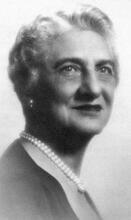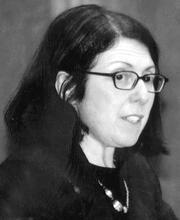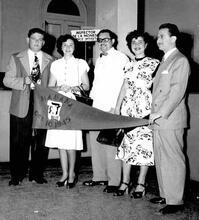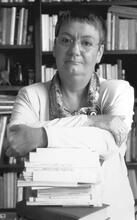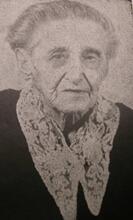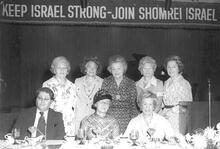Bessie Goldstein Gotsfeld
Bessie Goldstein Gotsfeld helped organize American Mizrachi Women, pushed for its independence from men’s groups, and made aiding children in Israel a major goal of the organization. Gotsfeld married in 1909 and in 1911 moved to Seattle, where she helped Jewish refugees from Russia make new lives in America. Seven years later, in New York, she began working with various Jewish organizations, including the Mizrachi Organization of America, and in 1925 began calling openly for a women’s counterpart to the organization that would have its own administration and financial resources. In 1926 she settled in Tel Aviv as American Mizrachi Women’s Palestine representative, focusing the organization’s work there on creating vocational schools, youth villages, and farms for religious children.
Family and Education
Bessie Goldstein Gotsfeld’s name is synonymous with American Mizrachi Women (known today as Amit), the religious organization she helped to form. For thirty years, Gotsfeld was the Palestine (later Israel) representative for the organization. She supervised the establishment of vocational schools, children’s villages, and farms for religious youth, and forged a connection between women in the United States and children in Israel.
The first child of Raisel and Leon Goldstein, Bessie was born in 1888 during Lit. "booths." A seven-day festival (eight days outside Israel) beginning on the 15th day of the Hebrew month of Tishrei to commemorate the sukkot in which the Israelites dwelt during their 40-year sojourn in the desert after the Exodus from Egypt; Tabernacles; "Festival of the Harvest."Sukkot, in Przemysl, Poland. When Raisel Goldstein died, Bessie became a mother for her two sisters and three brothers. Her father, a Talmudic scholar, welcomed Zionist travelers in their Hasidic home. Receiving a religious education at home and a secular education in a Catholic school, Bessie graduated as class valedictorian. In 1905, after her father remarried, the family immigrated to New York. There, Bessie married her English tutor, Mendel Gotsfeld, an Australian, in 1909. Mendel Gotsfeld played an integral role in his wife’s life, supporting her as a businessman and property owner, and often helping her to entertain leaders of the Mizrachi organization.
Career
In 1911, the couple moved to Seattle, where Gotsfeld helped Jewish refugees fleeing Russia. After seven years, they returned to New York, and Gotsfeld began working for Jewish women’s organizations, including a New York group associated with the Mizrachi Organization of America. Gotsfeld believed that religious women needed their own association, and in 1925, at the men’s American Mizrachi Convention, she encouraged regional women’s groups to form their own national association, the Mizrachi Women’s Organization of America (later American Mizrachi Women). The organization set a goal of supporting and administrating its own projects—an extremely bold step for the women to take because, in the past, all organizational money had been administered by men.
In 1926, Gotsfeld traveled to Palestine to find a project for the new organization. Soon, she became its Palestine representative, making Tel Aviv the Gotsfelds’ home and the American Mizrachi Women the primary interest in her life. She served as on-site planner and overseer for vocational schools and children’s villages for Jewish girls, Youth Lit. "ascent." A "calling up" to the Torah during its reading in the synagogue.Aliyah children, Holocaust survivors, and new immigrants. She kept the membership informed about life in Israel through a column in the association’s magazine.
Gotsfeld received many honors for her work. In particular, the Bessie Gotsfeld Children’s Village and Farm School, Kfar Batya (1947), and the Bessie Gotsfeld Forest (1955) were named for her. When she died in Tel Aviv on July 29, 1962, she was honorary national president of the Mizrachi Women’s Organization of America and head of its Israel executive council.
In spite of having diabetes, Bessie Goldstein Gotsfeld was a ceaseless worker, known for her political and diplomatic skills. She was a career woman in an Orthodox society where traditionally only men held positions of leadership and an observant person in a society whose early heroes tended to be secular. In her outlook and in her actions, Gotsfeld was a product of both American and Jewish cultures. She helped to build a bridge between America and Israel, where American democracy, practical knowledge, and funds could flow to Israel, and Jewish tradition, spirituality and culture could travel to America.
Selected Works by Bessie Goldstein Gotsfeld
“Letter from Mrs. Gotsfeld.” Bulletin of the Mizrachi Women’s Organization of America 1 (January 1933): 5.
“The Mizrachi Vocational Institution.” In Mizrachi, edited by P. Churgin (1936).
“Palestine Report.” Mizrachi Women’s News (December 1942): 12.
“Palestine Report, 1940–1941.” Mizrachi Women’s News 10 (1941): 3–4.
Abramov, S. Zalman. Perpetual Dilemma: Jewish Religion in the Jewish State (1976).
EJ.
Goldfeld, Leona M. Bessie (1982).
Goldstein, Belle J. “Twenty Years of Mizrachi Women.” The Mizrachi Women (January 1946): 5.
Golman, Eliezer [nephew]. Interview by author, 1990; Golub, Mollie F. “The American Role of the Mizrachi Women in the Upbuilding of Our Homeland.” Mizrachi Women’s News (September 1942): 7.
Gotsfeld, Bessie. Correspondence. AMIT Women Archives, NYC; Halpern, Ben. The Idea of the Jewish State (1969).
Obituary. NYTimes, July 31, 1962, 30:1.
“Palestine Correspondence.” Bulletin of the Mizrachi Organization of America 2–3 (January 1933): 1+.
Shargal, Baila Round. Female Leadership in the American Jewish Community: Bessie Gotsfeld and the Mizrachi Women’s Organization of America. Lanham, MD: University Press of America, 2007.
Shargal, Baila Round. “’Never a rubber stamp’: Bessie Gotsefld, founder of Mizrahi Women of America.” In American Jewish Women and the Zionist Enterprise, edited by Mark Raider and Shulamit Reinharz. Waltham, MA: Brandeis University Press, 2005.
Vital, David. Zionism: The Formative Years (1982).



